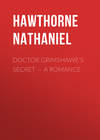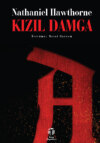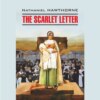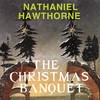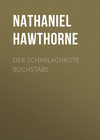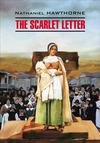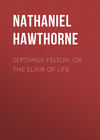Kitabı oku: «Doctor Grimshawe's Secret — a Romance», sayfa 8
CHAPTER XI
There is — or there was, now many years ago, and a few years also it was still extant — a chamber, which when I think of, it seems to me like entering a deep recess of my own consciousness, a deep cave of my nature; so much have I thought of it and its inmate, through a considerable period of my life. After I had seen it long in fancy, then I saw it in reality, with my waking eyes; and questioned with myself whether I was really awake.
Not that it was a picturesque or stately chamber; not in the least. It was dim, dim as a melancholy mood; so dim, to come to particulars, that, till you were accustomed to that twilight medium, the print of a book looked all blurred; a pin was an indistinguishable object; the face of your familiar friend, or your dearest beloved one, would be unrecognizable across it, and the figures, so warm and radiant with life and heart, would seem like the faint gray shadows of our thoughts, brooding in age over youthful images of joy and love. Nevertheless, the chamber, though so difficult to see across, was small. You detected that it was within very narrow boundaries, though you could not precisely see them; only you felt yourself shut in, compressed, impeded, in the deep centre of something; and you longed for a breath of fresh air. Some articles of furniture there seemed to be; but in this dim medium, to which we are unaccustomed, it is not well to try to make out what they were, or anything else — now at least — about the chamber. Only one thing; small as the light was, it was rather wonderful how there came to be any; for no windows were apparent; no communication with the outward day. [Endnote: 1.]
Looking into this chamber, in fancy it is some time before we who come out of the broad sunny daylight of the world discover that it has an inmate. Yes, there is some one within, but where? We know it; but do not precisely see him, only a presence is impressed upon us. It is in that corner; no, not there; only a heap of darkness and an old antique coffer, that, as we look closely at it, seems to be made of carved wood. Ah! he is in that other dim corner; and now that we steal close to him, we see him; a young man, pale, flung upon a sort of mattress-couch. He seems in alarm at something or other. He trembles, he listens, as if for voices. It must be a great peril, indeed, that can haunt him thus and make him feel afraid in such a seclusion as you feel this to be; but there he is, tremulous, and so pale that really his face is almost visible in the gloomy twilight. How came he here? Who is he? What does he tremble at? In this duskiness we cannot tell. Only that he is a young man, in a state of nervous excitement and alarm, looking about him, starting to his feet, sometimes standing and staring about him.
Has he been living here? Apparently not; for see, he has a pair of long riding-boots on, coming up to the knees; they are splashed with mud, as if he had ridden hastily through foul ways; the spurs are on the heel. A riding-dress upon him. Ha! is that blood upon the hand which he clasps to his forehead.
What more do you perceive? Nothing, the light is so dim; but only we wonder where is the door, and whence the light comes. There is a strange abundance of spiders, too, we perceive; spinning their webs here, as if they would entrammel something in them. A mouse has run across the floor, apparently, but it is too dim to detect him, or to detect anything beyond the limits of a very doubtful vagueness. We do not even know whether what we seem to have seen is really so; whether the man is young, or old, or what his surroundings are; and there is something so disagreeable in this seclusion, this stifled atmosphere, that we should be loath to remain here long enough to make ourselves certain of what was a mystery. Let us forth into the broad, genial daylight, for there is magic, there is a devilish, subtile influence, in this chamber; which, I have reason to believe, makes it dangerous to remain here. There is a spell on the threshold. Heaven keep us safe from it!
Hark! has a door unclosed? Is there another human being in the room? We have now become so accustomed to the dim medium that we distinguish a man of mean exterior, with a look of habitual subservience that seems like that of an English serving-man, or a person in some menial situation; decent, quiet, neat, softly-behaved, but yet with a certain hard and questionable presence, which we would not well like to have near us in the room.
“Am I safe?” asks the inmate of the prison-chamber.
“Sir, there has been a search.”
“Leave the pistols,” said the voice.
Again, [Endnote: 2] after this time, a long time extending to years, let us look back into that dim chamber, wherever in the world it was, into which we had a glimpse, and where we saw apparently a fugitive. How looks it now? Still dim, — perhaps as dim as ever, — but our eyes, or our imagination, have gained an acquaintance, a customariness, with the medium; so that we can discern things now a little more distinctly than of old. Possibly, there may have been something cleared away that obstructed the light; at any rate, we see now the whereabouts — better than we did. It is an oblong room, lofty but narrow, and some ten paces in length; its floor is heavily carpeted, so that the tread makes no sound; it is hung with old tapestry, or carpet, wrought with the hand long ago, and still retaining much of the ancient colors, where there was no sunshine to fade them; worked on them is some tapestried story, done by Catholic hands, of saints or devils, looking each equally grave and solemnly. The light, whence comes it? There is no window; but it seems to come through a stone, or something like it, — a dull gray medium, that makes noonday look like evening twilight. Though sometimes there is an effect as if something were striving to melt itself through this dull medium, and — never making a shadow — yet to produce the effect of a cloud gathering thickly over the sun. There is a chimney; yes, a little grate in which burns a coal fire, a dim smouldering fire, it might be an illumination, if that were desirable.
What is the furniture? An antique chair, — one chair, no more. A table, many-footed, of dark wood; it holds writing-materials, a book, too, on its face, with the dust gathered on its back. There is, moreover, a sort of antique box, or coffer, of some dark wood, that seems to have been wrought or carved with skill, wondrous skill, of some period when the art of carving wainscot with arms and devices was much practised; so that on this coffer — some six feet long it is, and two or three broad — most richly wrought, you see faces in relief of knight and dame, lords, heraldic animals; some story, very likely, told, almost revelling in Gothic sculpture of wood, like what we have seen on the marble sarcophagus of the old Greeks. It has, too, a lock, elaborately ornamented and inlaid with silver.
What else; only the spider’s webs spinning strangely over everything; over that light which comes into the room through the stone; over everything. And now we see, in a corner, a strange great spider curiously variegated. The ugly, terrible, seemingly poisonous thing makes us shudder. [Endnote: 3.]
What, else? There are pistols; they lie on the coffer! There is a curiously shaped Italian dagger, of the kind which in a groove has poison that makes its wound mortal. On the old mantel-piece, over the fireplace, there is a vial in which are kept certain poisons. It would seem as if some one had meditated suicide; or else that the foul fiend had put all sorts of implements of self-destruction in his way; so that, in some frenzied moment, he might kill himself.
But the inmate! There he is; but the frenzied alarm in which we last saw him seems to have changed its character. No throb, now; no passion; no frenzy of fear or despair. He sits dull and motionless. See; his cheek is very pale; his hair long and dishevelled. His beard has grown, and curls round his face. He has on a sleeping-gown, a long robe as of one who abides within doors, and has nothing to do with outward elements; a pair of slippers. A dull, dreamy reverie seems to have possessed him. Hark! there is again a stealthy step on the floor, and the serving-man is here again. There is a peering, anxious curiosity in his face, as he struts towards him, a sort of enjoyment, one would say, in the way in which he looks at the strange case.
“I am here, you know,” he says, at length, after feasting his eyes for some time on the spectacle.
“I hear you!” says the young man, in a dull, indifferent tone.
“Will not your honor walk out to-day?” says the man. “It is long now since your honor has taken the air.”
“Very long,” says the master, “but I will not go out to-day. What weather is it?”
“Sunny, bright, a summer day,” says the man. “But you would never know it in these damp walls. The last winter’s chill is here yet. Had not your honor better go forth?”
It might seem that there was a sort of sneer, deeply hidden under respect and obeisance, in the man’s words and craftily respectful tone; deeply hidden, but conveying a more subtile power on that account. At all events, the master seemed aroused from his state of dull indifference, and writhed as with poignant anguish — an infused poison in his veins — as the man spoke.
“Have you procured me that new drug I spoke of?” asked the master.
“Here it is,” said the man, putting a small package on the table.
“Is it effectual?”
“So said the apothecary,” answered the man; “and I tried it on a dog. He sat quietly a quarter of an hour; then had a spasm or two, and was dead. But, your honor, the dead carcass swelled horribly.”
“Hush, villain! Have there — have there been inquiries for me, — mention of me?”
“O, none, sir, — none, sir. Affairs go on bravely, — the new live. The world fills up. The gap is not vacant. There is no mention of you. Marry, at the alehouse I heard some idle topers talking of a murder that took place some few years since, and saying that Heaven’s vengeance would come for it yet.”
“Silence, villain, there is no such thing,” said the young man; and, with a laugh that seemed like scorn, he relapsed into his state of sullen indifference; during which the servant stole away, after looking at him some time, as if to take all possible note of his aspect. The man did not seem so much to enjoy it himself, as he did to do these things in a kind of formal and matter-of-course way, as if he were performing a set duty; as if he were a subordinate fiend, and were doing the duty of a superior one, without any individual malice of his own, though a general satisfaction in doing what would accrue to the agglomeration of deadly mischief. He stole away, and the master was left to himself.
By and by, by what impulse or cause it is impossible to say, he started upon his feet in a sudden frenzy of rage and despair. It seemed as if a consciousness of some strange, wild miserable fate that had befallen him had come upon him all at once; how that he was a prisoner to a devilish influence, to some wizard might, that bound him hand and foot with spider’s web. So he stamped; so he half shrieked, yet stopped himself in the midst, so that his cry was stifled and smothered. Then he snatched up the poisoned dagger and looked at it; the noose, and put it about his neck, — evil instrument of death, — but laid it down again. And then was a voice at the door: “Quietly, quietly you know, or they will hear you.” And at that voice he sank into sullen indifference again.
CHAPTER XII
A traveller with a knapsack on his shoulders comes out of the duskiness of vague, unchronicled times, throwing his shadow before him in the morning sunshine along a well-trodden, though solitary path.
It was early summer, or perhaps latter spring, and the most genial weather that either spring or summer ever brought, possessing a character, indeed, as if both seasons had done their utmost to create an atmosphere and temperature most suitable for the enjoyment and exercise of life. To one accustomed to a climate where there is seldom a medium between heat too fierce and cold too deadly, it was a new development in the nature of weather. So genial it was, so full of all comfortable influences, and yet, somehow or other, void of the torrid characteristic that inevitably burns in our full sun-bursts. The traveller thought, in fact, that the sun was at less than his brightest glow; for though it was bright, — though the day seemed cloudless, — though it appeared to be the clear, transparent morning that precedes an unshadowed noon, — still there was a mild and softened character, not so perceptible when he directly sought to see it, but as if some veil were interposed between the earth and sun, absorbing all the passionate qualities out of the latter, and leaving only the kindly ones. Warmth was in abundance, and, yet, all through it, and strangely akin to it, there was a half-suspected coolness that gave the atmosphere its most thrilling and delicious charm. It was good for human life, as the traveller, felt throughout all his being; good, likewise, for vegetable life, as was seen in the depth and richness of verdure over the gently undulating landscape, and the luxuriance of foliage, wherever there was tree or shrub to put forth leaves.
The path along which the traveller was passing deserved at least a word or two of description: it was a well-trodden footpath, running just here along the edge of a field of grass, and bordered on one side by a hedge which contained materials within itself for varied and minute researches in natural history; so richly luxuriant was it with its diverse vegetable life, such a green intricacy did it form, so impenetrable and so beautiful, and such a Paradise it was for the birds that built their nests there in a labyrinth of little boughs and twigs, unseen and inaccessible, while close beside the human race to which they attach themselves, that they must have felt themselves as safe as when they sung to Eve. Homely flowers likewise grew in it, and many creeping and twining plants, that were an original part of the hedge, had come of their own accord and dwelt here, beautifying and enriching the verdant fence by way of repayment for the shelter and support which it afforded them. At intervals, trees of vast trunk and mighty spread of foliage, whether elms or oaks, grew in the line of the hedge, and the bark of those gigantic, age-long patriarchs was not gray and naked, like the trees which the traveller had been accustomed to see, but verdant with moss, or in many cases richly enwreathed with a network of creeping plants, and oftenest the ivy of old growth, clambering upward, and making its own twisted stem almost of one substance with the supporting tree. On one venerable oak there was a plant of mystic leaf, which the traveller knew by instinct, and plucked a bough of it with a certain reverence for the sake of the Druids and Christmas kisses and of the pasty in which it was rooted from of old.
The path in which he walked, rustic as it was and made merely by the feet that pressed it down, was one of the ancientest of ways; older than the oak that bore the mistletoe, older than the villages between which it passed, older perhaps than the common road which the traveller had crossed that morning; old as the times when people first debarred themselves from wandering freely and widely wherever a vagrant impulse led them. The footpath, therefore, still retains some of the characteristics of a woodland walk, taken at random, by a lover of nature not pressed for time nor restrained by artificial barriers; it sweeps and lingers along, and finds pretty little dells and nooks of delightful scenery, and picturesque glimpses of halls or cottages, in the same neighborhood where a highroad would disclose only a tiresome blank. They run into one another for miles and miles together, and traverse rigidly guarded parks and domains, not as a matter of favor, but as a right; so that the poorest man thus retains a kind of property and privilege in the oldest inheritance of the richest. The highroad sees only the outside; the footpath leads down into the heart of the country.
A pleasant feature of the footpath was the stile, between two fields; no frail and temporary structure, but betokening the permanence of this rustic way; the ancient solidity of the stone steps, worn into cavities by the hobnailed shoes that had pressed upon them: here not only the climbing foot had passed for ages, but here had sat the maiden with her milk-pail, the rustic on his way afield or homeward; here had been lover meetings, cheerful chance chats, song as natural as bird note, a thousand pretty scenes of rustic manners.
It was curious to see the traveller pause, to contemplate so simple a thing as this old stile of a few stone steps; antique as an old castle; simple and rustic as the gap in a rail fence; and while he sat on one of the steps, making himself pleasantly sensible of his whereabout, like one who should handle a dream and find it tangible and real, he heard a sound that bewitched him with still another dreamy delight. A bird rose out of the grassy field, and, still soaring aloft, made a cheery melody that was like a spire of audible flame, — rapturous music, as if the whole soul and substance of the winged creature had been distilled into this melody, as it vanished skyward.
“The lark! the lark!” exclaimed the traveller, recognizing the note (though never heard before) as if his childhood had known it.
A moment afterwards another bird was heard in the shadow of a neighboring wood, or some other inscrutable hiding-place, singing softly in a flute-like note, as if blown through an instrument of wood, — “Cuckoo! Cuckoo!” — only twice, and then a stillness.
“How familiar these rustic sounds!” he exclaimed. “Surely I was born here!”
The person who thus enjoyed these sounds, as if they were at once familiar and strange, was a young man, tall and rather slenderly built, and though we have called him young, there were the traces of thought, struggle, and even of experience in his marked brow and somewhat pale face; but the spirit within him was evidently still that of a youth, lithe and active, gazing out of his dark eyes and taking note of things about him, with an eager, centring interest, that seemed to be unusually awake at the present moment.
It could be but a few years since he first called himself a man; but they must have been thickly studded with events, turbulent with action, spent amidst circumstances that called for resources of energy not often so early developed; and thus his youth might have been kept in abeyance until now, when in this simple rural scene he grew almost a boy again. As for his station in life, his coarse gray suit and the knapsack on his shoulders did not indicate a very high one; yet it was such as a gentleman might wear of a morning, or on a pedestrian ramble, and was worn in a way that made it seem of a better fashion than it really was, as it enabled him to find a rare enjoyment, as we have seen, in by-path, hedge-row, rustic stile, lark, and cuckoo, and even the familiar grass and clover blossom. It was as if he had long been shut in a sick-chamber or a prison; or, at least, within the iron cage of busy life, that had given him but few glimpses of natural things through its bars; or else this was another kind of nature than he had heretofore known.
As he walked along (through a kind of dream, though he seemed so sensibly observant of trifling things around him,) he failed to notice that the path grew somewhat less distinctly marked, more infringed upon by grass, more shut in by shrubbery; he had deviated into a side track, and, in fact, a certain printed board nailed against a tree had escaped his notice, warning off intruders with inhospitable threats of prosecution. He began to suspect that he must have gone astray when the path led over plashy ground with a still fainter trail of preceding footsteps, and plunged into shrubbery, and seemed on the point of deserting him altogether, after having beguiled him thus far. The spot was an entanglement of boughs, and yet did not give one the impression of wildness; for it was the stranger’s idea that everything in this long cultivated region had been touched and influenced by man’s care, every oak, every bush, every sod, — that man knew them all, and that they knew him, and by that mutual knowledge had become far other than they were in the first freedom of growth, such as may be found in an American forest. Nay, the wildest denizens of this sylvan neighborhood were removed in the same degree from their primeval character; for hares sat on their hind legs to gaze at the approaching traveller, and hardly thought it worth their while to leap away among some ferns, as he drew near; two pheasants looked at him from a bough, a little inward among the shrubbery; and, to complete the wonder, he became aware of the antlers and brown muzzle of a deer protruding among the boughs, and though immediately there ensued a great rush and rustling of the herd, it seemed evidently to come from a certain lingering shyness, an instinct that had lost its purpose and object, and only mimicked a dread of man, whose neighborhood and familiarity had tamed the wild deer almost into a domestic creature. Remembering his experience of true woodland life, the traveller fancied that it might be possible to want freer air, less often used for human breath, than was to be found anywhere among these woods.
But then the sweet, calm sense of safety that was here: the certainty that with the wild element that centuries ago had passed out of this scene had gone all the perils of wild men and savage beasts, dwarfs, witches, leaving nature, not effete, but only disarmed of those rougher, deadlier characteristics, that cruel rawness, which make primeval Nature the deadly enemy even of her own children. Here was consolation, doubtless; so we sit down on the stone step of the last stile that he had crossed, and listen to the footsteps of the traveller, and the distant rustle among the shrubbery, as he goes deeper and deeper into the seclusion, having by this time lost the deceitful track. No matter if he go astray; even were it after nightfall instead of noontime, a will-o’-the-wisp, or Puck himself, would not lead him into worse harm than to delude him into some mossy pool, the depths of which the truant schoolboys had known for ages. Nevertheless, some little time after his disappearance, there was the report of a shot that echoed sharp and loud, startling the pheasants from their boughs, and sending the hares and deer a-scampering in good earnest.
We next find our friend, from whom we parted on the footpath, in a situation of which he then was but very imperfectly aware; for, indeed, he had been in a state of unconsciousness, lasting until it was now late towards the sunset of that same day. He was endeavoring to make out where he was, and how he came thither, or what had happened; or whether, indeed, anything had happened, unless to have fallen asleep, and to be still enveloped in the fragments of some vivid and almost tangible dream, the more confused because so vivid. His wits did not come so readily about him as usual; there may have been a slight delusion, which mingled itself with his sober perceptions, and by its leaven of extravagance made the whole substance of the scene untrue. Thus it happened that, as it were at the same instant, he fancied himself years back in life, thousands of miles away, in a gloomy cobwebbed room, looking out upon a graveyard, while yet, neither more nor less distinctly, he was conscious of being in a small chamber, panelled with oak, and furnished in an antique style. He was doubtful, too, whether or no there was a grim feudal figure, in a shabby dressing-gown and an old velvet cap, sitting in the dusk of the room, smoking a pipe that diffused a scent of tobacco, — quaffing a deep-hued liquor out of a tumbler, — looking upwards at a spider that hung above. “Was there, too, a child sitting in a little chair at his footstool?” In his earnestness to see this apparition more distinctly, he opened his eyes wider and stirred, and ceased to see it at all.
But though that other dusty, squalid, cobwebbed scene quite vanished, and along with it the two figures, old and young, grim and childish, of whose portraits it had been the framework, still there were features in the old, oaken-panelled chamber that seemed to belong rather to his dream. The panels were ornamented, here and there, with antique carving, representing over and over again an identical device, being a bare arm, holding the torn-off head of some savage beast, which the stranger could not know by species, any more than Agassiz himself could have assigned its type or kindred; because it was that kind of natural history of which heraldry alone keeps the menagerie. But it was just as familiar to his recollection as that of the cat which he had fondled in his childhood.
There was likewise a mantelpiece, heavily wrought of oak, quite black with smoke and age, in the centre of which, more prominent than elsewhere, was that same leopard’s head that seemed to thrust itself everywhere into sight, as if typifying some great mystery which human nature would never be at rest till it had solved; and below, in a cavernous hollow, there was a smouldering fire of coals; for the genial day had suddenly grown chill, and a shower of rain spattered against the small window-panes, almost at the same time with the struggling sunshine. And over the mantelpiece, where the light of the declining day came strongest from the window, there was a larger and more highly relieved carving of this same device, and underneath it a legend, in Old English letters, which, though his eyes could not precisely trace it at that distance, he knew to be this: —
“Hold hard the Head.”
Otherwise the aspect of the room bewildered him by not being known, since these details were so familiar; a narrow precinct it was, with one window full of old-fashioned, diamond-shaped panes of glass, a small desk table, standing on clawed feet; two or three high-backed chairs, on the top of each of which was carved that same crest of the fabulous brute’s head, which the carver’s fancy seemed to have clutched so strongly that he could not let it go; in another part of the room a very old engraving, rude and strong, representing some ruffled personage, which the stranger only tried to make out with a sort of idle curiosity, because it was strange he should dream so distinctly.
Very soon it became intolerably irritating that these two dreams, both purposeless, should have mingled and entangled themselves in his mind. He made a nervous and petulant motion, intending to rouse himself fully; and immediately a sharp pang of physical pain took him by surprise, and made him groan aloud.
Immediately there was an almost noiseless step on the floor; and a figure emerged from a deep niche, that looked as if it might once have been an oratory, in ancient times; and the figure, too, might have been supposed to possess the devout and sanctified character of such as knelt in the oratories of ancient times. It was an elderly man, tall, thin, and pale, and wearing a long, dark tunic, and in a peculiar fashion, which — like almost everything else about him — the stranger seemed to have a confused remembrance of; this venerable person had a benign and pitiful aspect, and approached the bedside with such good will and evident desire to do the sufferer good, that the latter felt soothed, at least, by his very presence. He lay, a moment, gazing up at the old man’s face, without being able to exert himself to say a word, but sensible, as it were, of a mild, soft influence from him, cooling the fever which seemed to burn in his veins.
“Do you suffer much pain?” asked the old man, gently.
“None at all,” said the stranger; but again a slight motion caused him to feel a burning twinge in his shoulder. “Yes; there was a throb of strange anguish. Why should I feel pain? Where am I?”
“In safety, and with those who desire to be your friends,” said the old man. “You have met with an accident; but do not inquire about it now. Quiet is what you need.”
Still the traveller gazed at him; and the old man’s figure seemed to enter into his dream, or delirium, whichever it might be, as if his peaceful presence were but a shadow, so quaint was his address, so unlike real life, in that dark robe, with a velvet skullcap on his head, beneath which his hair made a silvery border; and looking more closely, the stranger saw embroidered on the breast of the tunic that same device, the arm and the leopard’s head, which was visible in the carving of the room. Yes; this must still be a dream, which, under the unknown laws which govern such psychical states, had brought out thus vividly figures, devices, words, forgotten since his boyish days. Though of an imaginative tendency, the stranger was nevertheless strongly tenacious of the actual, and had a natural horror at the idea of being seriously at odds, in beliefs, perceptions, conclusions, with the real world about him; so that a tremor ran through him, as if he felt the substance of the world shimmering before his eyes like a mere vaporous consistency.
“Are you real?” said he to the antique presence; “or a spirit? or a fantasy?”
